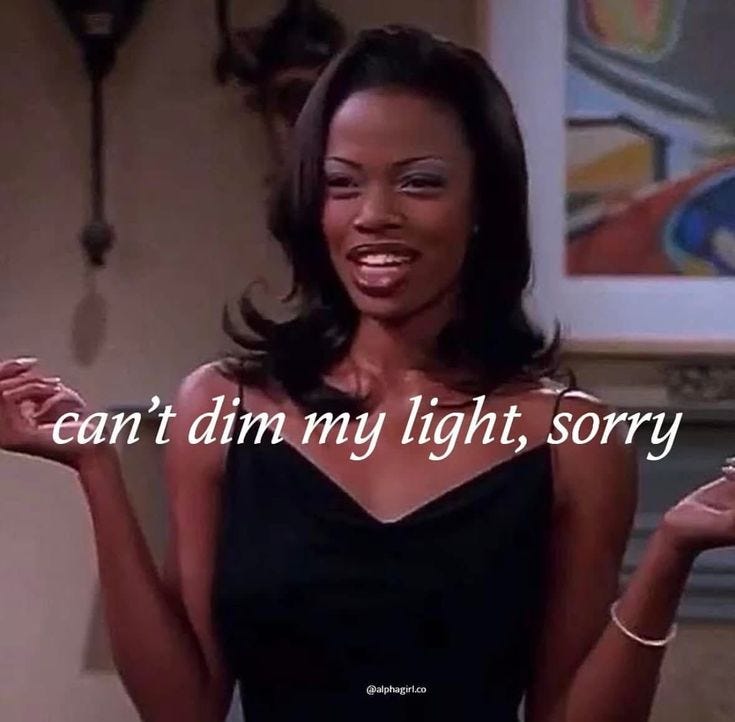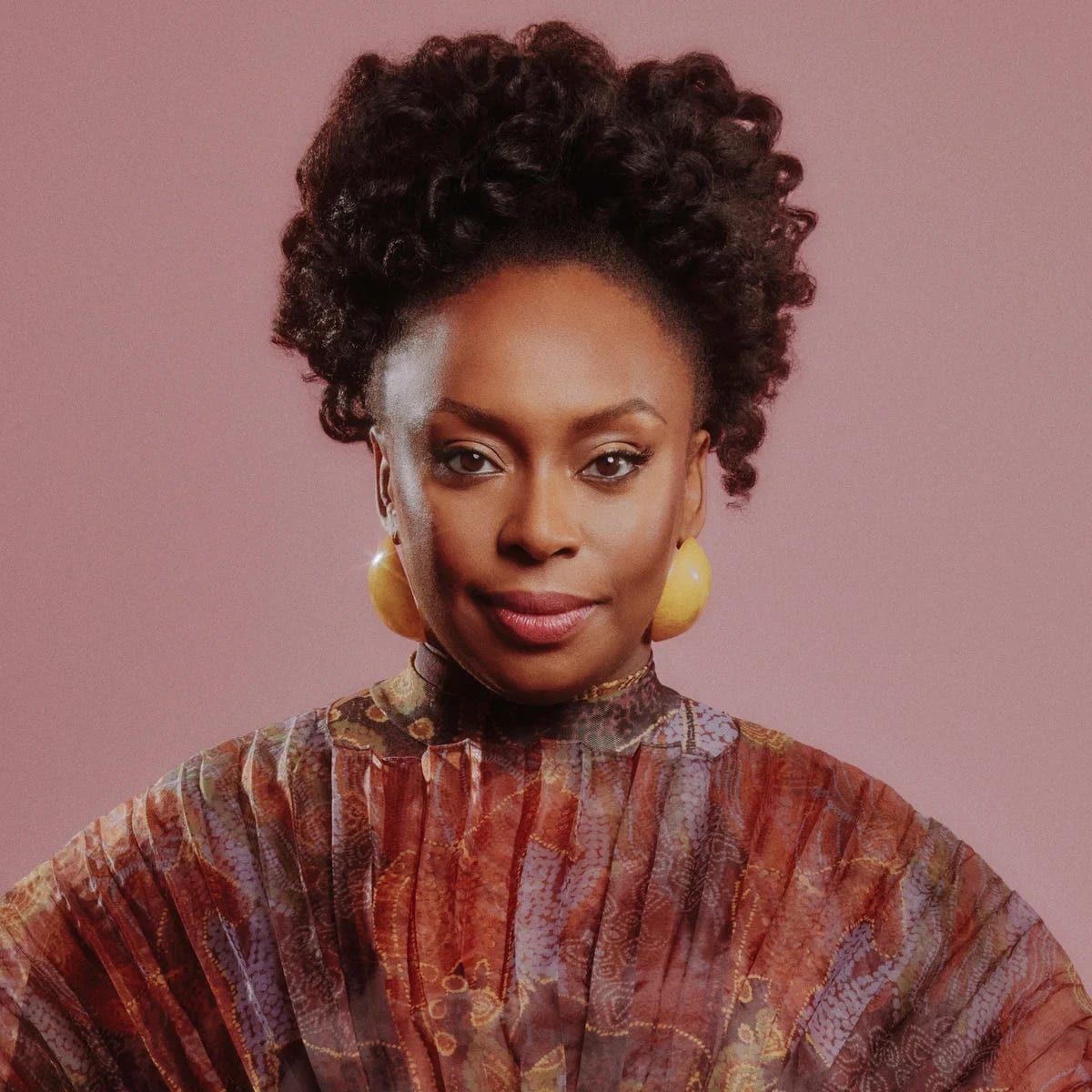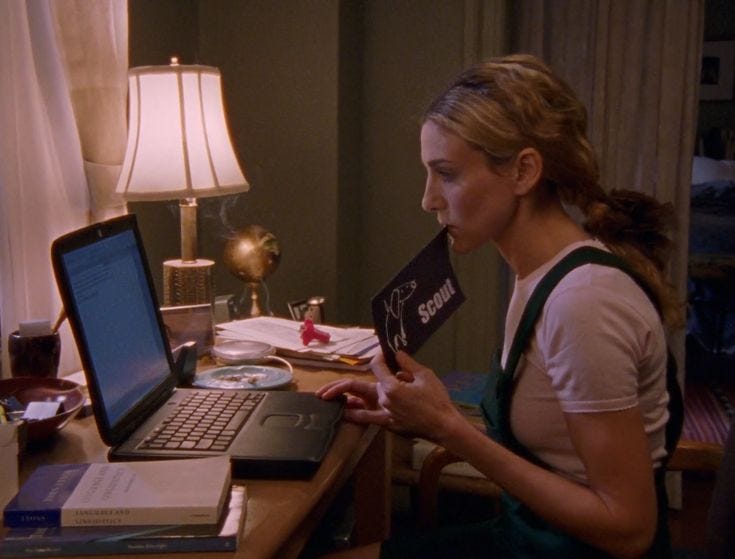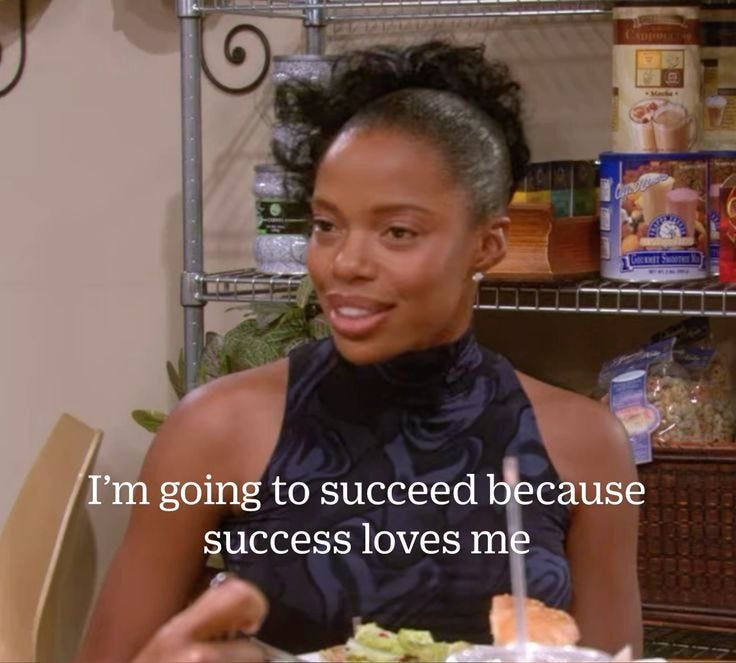It takes a certain amount of audacity to claim you're anything other than what people expect you to be. Take a writer, for example—or, really, anyone in a creative field, especially if you don’t look like an interim Parisian resident, two cigarettes away from needing a summer getaway.
Luckily, I’ve got audacity in bucketloads.
Throughout this year, I’ve had to reintroduce myself to people, explaining that this writing thing isn’t new. I just didn’t care to involve them at the time1. Sometimes I bring it up formally, referencing an essay I’ve written or a title I’ve been mulling over. Other times, I just say things like “it’s probably because I’m a writer” and let the cards fall where they may. The revelation is met with surprise but understanding - writing is the most Onyi thing I could do.
And yet, sometimes I feel their doubt hanging in the pause. Take H, for example. A man I hadn’t seen in two years who probably thinks he knows me more than he does.
“You really define yourself as that?” he asks, then launches into something about not believing in labels—as a human, he says, he prefers to stay free and unrestricted.
I get it. But I’m not naive.
I see the same pattern at work all the time. It’s usually older, tenured customers who try to trip me up or flex their knowledge about cybersecurity or our products. I’m the intern, hired for my capabilities, and yet, somehow, still the one being tested.
What H really means to do is question my right, my credentials, if you will, to call myself a writer. My suspicions are confirmed when he asks, “Is that really writing?” in response to what I do write. I don’t bother offering clarification beyond a simple “Yes.” If there’s one thing I’ve learned, it’s that some conversations just aren’t worth having. Still, it got me thinking: Who gets to be a writer? Or anything beyond what convention allows for their identity?
No one bats an eye when I tell them I’m a computer science student with an interest in cyber and AI policy, nor should they. I am capable, educated and most importantly, deeply motivated. Maybe they would have a couple of decades ago, but the truth is Nigerian women in the diaspora are amongst the most educated immigrants. In the US, 58.6% of us hold a college diploma, and 28.3% hold graduate-level degrees. In the UK, we represent the largest cohort of Africans at the Universities. This is the new normal. Our academic aptitude, specifically in STEM spaces, is reflected in the numbers. By choosing the career path I have, I am making the most of the foundation those who’ve gone before me have laid. It is, however, also expected. Anyone who comes from a non-Western background knows the drill. Lawyer, Doctor, Engineer, Business. Anything solid. That’s the plan. It just so happens that I do love cybersecurity.
Because of this, I’m often asked how I’m going to do it - juggle these creative endeavours and my “real” career. Luckily, my parents have never imposed strict expectations on me beyond doing well, but I do feel as though I am expected to focus on a single career track. My response, my insistence on doing both indefinitely, is not one of stubbornness but resistance.
In a conversation with my mother last weekend, I asked, “How many writers do you think Nigeria has lost due to circumstances they couldn’t help. How many chose to become something else, a farmer, a lawyer, a doctor, out of necessity or just societal pressure?”. She hears me, but brings up the Chimamanda Adichie’s and Chinua Achebe’s of the world. Whilst I have nothing but profound respect for those two, those are not the kind of writers I’m talking about. I’m talking about the child who writes because they have a wild imagination, who dreams of outlandish stories and even better characters. The girl who may never want to write a bestselling novel but writes regardless. The other, who simply gave it up, not because of passion lost, but because they needed the time back to survive. I’m talking about the writers who might eventually become the Chinua Achebe of the world, but couldn’t even begin.
Whenever Nigerians, or quite frankly, any underrepresented community in the West, deviates from the ‘safe’ route to success, the expectation is that they must excel to make the sacrifice of security worth it. In the eyes of the community, there is only one choice to be made: a safe career or otherwise. Of course, I understand the reasoning, the historical context for why this and the role it plays in our sustainability, but it’s time we talk about the cost.
What does it mean for generations of storytellers to be discouraged from dreaming? We lose a certain spark, the ability to think bigger and better. We stop emphasising the importance of a different, more nuanced education, one with which we learn how to interact with the real world, not just the theoretical. How to handle emotions, actions and consequences. We stop reading as much, we stop creating as much. Worse, we forget the importance of fun. We erase the right to mediocracy or simply doing things because we can, and want to, without a greater purpose or agenda.
In a way, we become complicit in the gatekeeping of our success. By positioning these STEM careers as a pathway out of struggle or a way to stave it off, we restrict creativity for those who can afford to take risks. I am not naive to my privilege in this way. Soon, we are left with a creative cohort that is incapable of representing the larger community. When done with care, the work transcends barriers, and at its worst, it feels foreign.
This is how creativity slowly becomes synonymous with the elite, and the diaspora continues to go underrepresented on a global stage. Traditional art forms become history, victims of revisionism and vilification. Take, for example, the outcry towards the references to West African culture Beyoncé made in Black Is King. A steady stream of devil-worshipping accusations came in quickly, the same ones that get recited each year with a new reference or interpretation. The reaction amongst some to the movie Sinner is the perfect example. In addition, we need to stop interacting with art that is considered basic or simplistic, prioritising art that is complex or innately harder to understand to represent the calibre of the people allowed to make it. We forget art comes in all shapes and sizes.
Which in turn means I’m met with the likes of H, who, whether he knows how it sounds or not, is doubting my claim to the title of writer.
Sparingly, I’ll think in moments of frustration, would it be easier to believe if I looked the part? You know what I mean. Think Fleabag, Carrie Bradshaw and the rest. Would it be easier to attract readers on TikTok? Even on Substack, when the focus really should be on the words and not the aesthetics of those writing them, I feel the difference. I watch hordes of white women who all seem to suspiciously live in NYC, write articles on the same three topics (Sabrina Carpenter, the loss of girlhood, and men), and are met with a flood of engagement. This is no means my attempt to discredit them, but in moments of resistance, their experience feels so much easier. Special mention to that guy on TikTok who got a book deal without writing a single word.
This frustration was the inspiration behind an essay that most of you know me from. Girlhood Felt Like an Exclusive Members’ Club. I would be lying if, at times, I haven’t struggled with how much of my authentic self should bleed through in my writing and my online presence. In the beginning, I refrained from making too many Nigerian references or letting our snappy but entertaining humour inform my essays. On any given day, my accent could be different on TikTok. My mother likes to joke about my accents, having lived in three distinct countries, I have multiple, all authentic, but some more innate than others. I’m sure many others can relate. We often have to questions, is there space here for me? Is there space for my work and my authentic self? Can I write about race, politics, or my unique struggles without alienating readers? Oftentimes, we are taught and shown that the answer is no.
I’m reminded of one of my many talented friends who began interviewing for writing and journalism positions and was told outright the sad but infamous truth: it’s filled with nepotism. The barrier to becoming, let alone being perceived as a ‘real’ writer, is unjustifiably high for some, considering what it is we are dealing with. Writing is about community, it’s about sharing, learning and allowing readers to step out of themselves into your world momentarily. At its best, it’s love. What good does it do to prioritise exclusivity other than make those already acceptable comfortable at the detriment of new emerging talent? If anything, literature should be a space in which meritocracy thrives, but it’s becoming more and more of a myth. Not only is it often required to flatten yourself, pretend to be a different version of yourself, but you now have to pretend it’s solely hard work that got you there. The focus seems to be shifting to access and not talent.
Perhaps there is a fear of degrading an art form. We are having to rethink what ‘good’ writing sounds like. Most of our reading is done on social media - captions, tweets, memes- instead of in the pages of books. Readers complain about books clearly written for a Netflix adaptation. I agree with most of it, although I do think our propensity to focus on the negative means the good often flies under the radar. Then, of course, there’s the question of who decides what good art is? The topic of taste is a complex one because it’s so broad and so often informed by our political and social climates. I wrote about it briefly in a past essay: from classy to trashy; taste as a social weapon. What I will say is that as we move into a more conservative and cutthroat environment, be mindful of what seems to take precedence.
To the question of what we do to maintain a modicum of integrity in creatives. I, an expect by no means, expect us to do the work.
It’s up to us to uphold standards, show publishing houses what we like and what we don’t appreciate. We take it upon ourselves to seek out those creatives, those writers who write what we want to read and lift them up. They are out there; they may just not look or sound like what you’re used to. It’s for that reason I’m grateful to platforms like Substack, which, for the most part, enable the kind of discovery we so desperately need.
So yes, I call myself a writer and I do so proudly. I write the essays I wish I could have read earlier, and I believe in what I have to say. Each restack is with a meaningful comment or reader that can relate, confirming as much. I’m surprised and grateful each time. I cringed recently when someone called me a creator because of the piles of negative associations I absorb with each scroll on the FYP, but I’ve become less shocked by the label. Creating is what I do. I’m lucky enough to have not one but multiple passions from an early age, with the circumstances to indulge in most of them. It may be hard, and it may not always be rewarding, but I consider it a privilege to do so. I could just as easily have been born without these circumstances, and I pray more children are afforded them.
As per usual, you can find me on TikTok, Instagram (daily media recommendations) and Arca (curated recommendations)
I explain a little bit about why in when your hinge date finds your substack











embarrassingly early but i’m already sat
This is SO GOOD!! I often feel like an imposter calling myself a writer, but each time is like a tiny act of resistance that's making space for myself to BE that writer instead of it just being the ones with viral posts